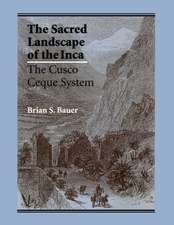Emergent Forms of Life and the Anthropological Voice
Autor Michael M. J. Fischeren Limba Engleză Paperback – 9 dec 2003
Preț: 308.90 lei
Nou
Puncte Express: 463
Preț estimativ în valută:
59.11€ • 61.87$ • 49.20£
59.11€ • 61.87$ • 49.20£
Carte tipărită la comandă
Livrare economică 31 martie-14 aprilie
Preluare comenzi: 021 569.72.76
Specificații
ISBN-13: 9780822332381
ISBN-10: 0822332388
Pagini: 496
Ilustrații: 34 illustrations
Dimensiuni: 155 x 230 x 29 mm
Greutate: 0.68 kg
Editura: MD – Duke University Press
Locul publicării:United States
ISBN-10: 0822332388
Pagini: 496
Ilustrații: 34 illustrations
Dimensiuni: 155 x 230 x 29 mm
Greutate: 0.68 kg
Editura: MD – Duke University Press
Locul publicării:United States
Recenzii
Michael M. J. Fischers anthropology outside the frame takes on an astounding range of contemporary subjects: Austrian politics, Polish and Iranian films, cyberspace, virtual surgery, xenotransplantation, the autobiographical construction of memory, the technoscientific representation of the social world, and the ethical complexities of fieldwork among tribal peoples. His extension of ethnography beyond its traditional concerns to the investigation of the emerging forms of human consciousness usually vaguely grouped as late- or postmodern sets out a broad new agenda for cultural description and political critique. An unstandard, adventurous, eye-opening work.Clifford GeertzTrue to its title, Emergent Forms of Life and the Anthropological Voice is about worlds coming into being in technoculture. Attentive especially to the new biologies and biotechnologies, information technologies, and ecological and environmental matters, Fischer explores what he calls ethical plateaus or domains of ethical challenge. This wonderful book neither condemns nor glorifies emergent worlds; instead it gives us deep and intelligent analysis and reflection from a distinctive ethnographic point of view. Culture comes alive here. As Fischer reminds us vividly, culture is not a variable. Culture is about relationships, about relating as a verb. Culture is a passage and a topos, and Fischer is a masterful guide.Donna Haraway"Emergent Forms of Life and the Anthropological Voice is a sprawling, enclycopedic work thatattests to Michael Fischer's impressive erudition, his openness to new modes of thought, hisenthusiastic commitment to a critical anthropology . . ."--Anthropos 100.2005 "[Michael M. J. Fischer] is one of America's most prominent anthropological theorists. . . . [T]his is an optimistic and hopeful book which I think does honor to the anthropological enterprise. . . ."David Napier, Anthropological QuarterlyMichael M. J. Fischer's collection of essays exuberantly cuts a wide swath through a vast and labyrinthine literature on cinema, pedagogy, autobiography, computers, molecular biology, museum studies, wood block prints, the AIDS epidemic, and much more. . . . Fischer has been navigating adroitly with great force and urgency through a whole set of interlocking discourses and practices; the interest and passion that he brings to his very eclectic approach is tangible. . . . The journey is an exhilarating one, and from the outside one must wonder how it worked out. Clearly not everything or everybody was aboard and, the connections made were undoubtedly often no more than partial. The nitty-gritty of the academic politics is glided over in the whirl of metaphoric tripping from topic to topic, field to field, genre to genre, science to science, text to text, image to image, and all the possible combinations one can imagine that hold between and amongst them. Whatever happened at MIT there is much to learn from, and to savor, in Fischer's contributions to that extended moment.Paul Rabinow, American Anthropologist
"Michael M. J. Fischer's 'anthropology outside the frame' takes on an astounding range of contemporary subjects: Austrian politics, Polish and Iranian films, cyberspace, virtual surgery, xenotransplantation, the autobiographical construction of memory, the technoscientific representation of the social world, and the ethical complexities of fieldwork among tribal peoples. His extension of ethnography beyond its traditional concerns to the investigation of the emerging forms of human consciousness usually vaguely grouped as 'late-' or 'postmodern' sets out a broad new agenda for cultural description and political critique. An unstandard, adventurous, eye-opening work."--Clifford Geertz "True to its title, Emergent Forms of Life and the Anthropological Voice is about worlds coming into being in technoculture. Attentive especially to the new biologies and biotechnologies, information technologies, and ecological and environmental matters, Fischer explores what he calls 'ethical plateaus' or domains of ethical challenge. This wonderful book neither condemns nor glorifies emergent worlds; instead it gives us deep and intelligent analysis and reflection from a distinctive ethnographic point of view. 'Culture' comes alive here. As Fischer reminds us vividly, culture is not a variable. Culture is about relationships, about relating as a verb. Culture is a passage and a topos, and Fischer is a masterful guide."--Donna Haraway "Emergent Forms of Life and the Anthropological Voice is a sprawling, enclycopedic work that attests to Michael Fischer's impressive erudition, his openness to new modes of thought, his enthusiastic commitment to a critical anthropology ..."--Anthropos 100.2005 "[Michael M. J. Fischer] is one of America's most prominent anthropological theorists... [T]his is an optimistic and hopeful book which I think does honor to the anthropological enterprise..."--David Napier, Anthropological Quarterly "Michael M. J. Fischer's collection of essays exuberantly cuts a wide swath through a vast and labyrinthine literature on cinema, pedagogy, autobiography, computers, molecular biology, museum studies, wood block prints, the AIDS epidemic, and much more... Fischer has been navigating adroitly with great force and urgency through a whole set of interlocking discourses and practices; the interest and passion that he brings to his very eclectic approach is tangible... The journey is an exhilarating one, and from the outside one must wonder how it worked out. Clearly not everything or everybody was aboard and, the connections made were undoubtedly often no more than partial. The nitty-gritty of the academic politics is glided over in the whirl of metaphoric tripping from topic to topic, field to field, genre to genre, science to science, text to text, image to image, and all the possible combinations one can imagine that hold between and amongst them. Whatever happened at MIT there is much to learn from, and to savor, in Fischer's contributions to that extended moment."--Paul Rabinow, American Anthropologist
"Michael M. J. Fischer's 'anthropology outside the frame' takes on an astounding range of contemporary subjects: Austrian politics, Polish and Iranian films, cyberspace, virtual surgery, xenotransplantation, the autobiographical construction of memory, the technoscientific representation of the social world, and the ethical complexities of fieldwork among tribal peoples. His extension of ethnography beyond its traditional concerns to the investigation of the emerging forms of human consciousness usually vaguely grouped as 'late-' or 'postmodern' sets out a broad new agenda for cultural description and political critique. An unstandard, adventurous, eye-opening work."--Clifford Geertz "True to its title, Emergent Forms of Life and the Anthropological Voice is about worlds coming into being in technoculture. Attentive especially to the new biologies and biotechnologies, information technologies, and ecological and environmental matters, Fischer explores what he calls 'ethical plateaus' or domains of ethical challenge. This wonderful book neither condemns nor glorifies emergent worlds; instead it gives us deep and intelligent analysis and reflection from a distinctive ethnographic point of view. 'Culture' comes alive here. As Fischer reminds us vividly, culture is not a variable. Culture is about relationships, about relating as a verb. Culture is a passage and a topos, and Fischer is a masterful guide."--Donna Haraway "Emergent Forms of Life and the Anthropological Voice is a sprawling, enclycopedic work that attests to Michael Fischer's impressive erudition, his openness to new modes of thought, his enthusiastic commitment to a critical anthropology ..."--Anthropos 100.2005 "[Michael M. J. Fischer] is one of America's most prominent anthropological theorists... [T]his is an optimistic and hopeful book which I think does honor to the anthropological enterprise..."--David Napier, Anthropological Quarterly "Michael M. J. Fischer's collection of essays exuberantly cuts a wide swath through a vast and labyrinthine literature on cinema, pedagogy, autobiography, computers, molecular biology, museum studies, wood block prints, the AIDS epidemic, and much more... Fischer has been navigating adroitly with great force and urgency through a whole set of interlocking discourses and practices; the interest and passion that he brings to his very eclectic approach is tangible... The journey is an exhilarating one, and from the outside one must wonder how it worked out. Clearly not everything or everybody was aboard and, the connections made were undoubtedly often no more than partial. The nitty-gritty of the academic politics is glided over in the whirl of metaphoric tripping from topic to topic, field to field, genre to genre, science to science, text to text, image to image, and all the possible combinations one can imagine that hold between and amongst them. Whatever happened at MIT there is much to learn from, and to savor, in Fischer's contributions to that extended moment."--Paul Rabinow, American Anthropologist
Notă biografică
Michael M. J. Fischer
Textul de pe ultima copertă
"True to its title, " Emergent Forms of Life and the Anthropological Voice" is about worlds coming into being in technoculture. Attentive especially to the new biologies and biotechnologies, information technologies, and ecological and environmental matters, Michael M. J. Fischer explores what he calls 'ethical plateaus' or domains of ethical challenge. This wonderful book neither condemns nor glorifies emergent worlds; instead it gives us deep and intelligent analysis and reflection from a distinctive ethnographic point of view. 'Culture' comes alive here. As Fischer reminds us vividly, culture is not a variable. Culture is about relationships, about relating as a verb. Culture is a passage and a topos, and Fischer is a masterful guide."--Donna Haraway
Cuprins
Descriere
Essays by a leading anthropologist on current dilemmas of theory, science, ethics, and cinema.















